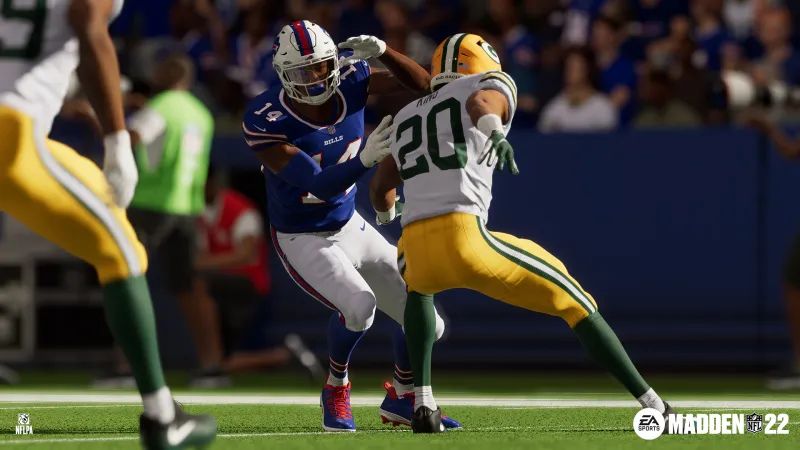
I’ve been covering sports games for more than a decade now, and I’ve been playing them for nearly three times that long. Whenever I talk to anyone about the latest middling entry in Madden NFL or NBA 2K, the first question I always receive is, “Should I buy this one if I already own last year’s?” I used to have to think more about whether I’d recommend a sports gamer pick up the latest iteration, but over the last several years, the games have felt just that way: iterative. Now, my answer is always, “How important is [this year’s tentpole feature] to you? How important is having the latest rosters?” If even one of those is wishy-washy, my answer is either “Wait for a sale” or “Just play last year’s game.” This song and dance has only become more noticeable as the years have continued.
My fellow Game Informer editor Kimberley Wallace recently wrote an op-ed about how stuck in a rut sports games are, and I could not agree more. The Madden team has tried to place increased emphasis on its Franchise mode (only after a massive fan campaign, mind you), the NHL series has implemented various gameplay enhancements to underwhelming effect, and the once-lauded NBA 2K franchise has felt staler and more exploitative with each passing entry. The defense always offered up for sports games is they have short development cycles since they need to come out at the start of each season. And that is a fair defense of the developer in many ways; it’s unlikely the developers are the ones making the ultimate decision to release a game every year. That decision likely comes from the licensee or the publisher.

However, the sports genre isn’t the only category, nor are EA Sports and 2K Games the only publishers that have been criticized for the annual or rapid release schedule. Other franchises, publishers, and genres that have come under fire in the past have found ways to alleviate or circumvent this problem. Capcom was previously notorious for its approach to releasing new versions of its Street Fighter titles. How did it solve the problem? It released Street Fighter V as a platform that evolved over the course of several years. Street Fighter V was hardly my favorite entry in the franchise, particularly at launch, but the development team kept working on it and improving it, demonstrating that the long-running series could break away from tradition and transition to the platform format.
What about other franchises criticized for their annual release schedules in the past? The ones that immediately come to mind are Call of Duty and Assassin’s Creed. Assassin’s Creed has moved away from the annual release method in recent years, instead giving players massive playgrounds in games like Odyssey and Valhalla, then building upon those worlds through enormous expansions (both paid and free) in subsequent years. Not only that, but the games are often developed by different (or even multiple) studios. Call of Duty has taken a similar approach, despite continuing to release a new game each year; instead of sacrificing the annual release calendar, publisher Activision implemented a rotation of development duties involving Infinity Ward, Treyarch, and Sledgehammer Games. Even then, the Call of Duty franchise has a product that carries over from one year to the next with Warzone.

The Assassin’s Creed series has found success in moving away from the annual release model
As you begin looking at the landscape of how games across the various genres have progressed in recent years, the annual release method feels antiquated. Developers can now release massive title updates, fundamentally changing parts of their games long after release. Madden NFL 22 even took advantage of this ability by revamping its entire scouting system in Franchise mode months after release. Why not apply that concept to multi-year projects? Why can’t I buy a copy of Madden, then for the next few years, purchase annual roster and feature updates in the form of less expensive seasonal content? That would also prevent the splintering of the community online and would make it so that when a new version of the game comes out a few years down the line, it actually feels like the next evolution of the series, instead of the half-steps we’ve grown accustomed to.
In talking with sports game developers from multiple companies in the past, one of the big sticking points is that the sports themselves don’t evolve that much year to year, making it difficult to innovate the games that are based on those sports. By transitioning to a platform-style approach, that would alleviate the expectation that each year should bring with it drastic changes. Believe it or not, EA Sports already has a game that operates somewhat in this manner: EA Sports UFC 4. The EA Sports UFC series has traditionally operated on a two-year cycle, with each entry building on the progress made in past games while still innovating in modes like career and the online suite. Granted, the UFC doesn’t have defined seasons like the NFL, NHL, MLB, and NBA, but it shows that at least a bi-annual release calendar can work for a sports title and even lead to more innovation and evolution within that series from game to game.

While it operates under different circumstances, the EA Sports UFC series has released games every two years
Of course, there are several factors that are out of the developers’ control. As alluded to before, it’s entirely possible that many licensing contracts (particularly the exclusive/restrictive ones) with established sports leagues require the publisher to release an annual iteration of the game. In addition, many of these annual games sell well regardless of criticism. For example, Madden NFL 22 was released in August and quickly became one of the best-selling games of 2021, dominating as the top-selling game during its release month. Likewise, both FIFA 22 and NBA 2K22 posted strong sales in their release month, coming in at number 2 and 3 respectively, only beat out by Madden NFL 22, which was once again reigned as the best-selling game for the second month in a row. These sales numbers occurred despite lower-than-usual Metacritic aggregate review scores, with Madden NFL 22’s PlayStation 5 score sitting at 68.
For the status quo of release schedule and method to change, both the leagues and the publishers of these games would need to see demonstrable evidence of a change being necessary or superior in some way. Sadly, I don’t know how that happens without a test case from another major player in the sports video game space, or a year of uncharacteristically underwhelming sales for a flagship release. Until then, I worry we’ll be stuck in the same annual schedule we’ve seen since sports games became big business.

It might be a long time before we see a major publisher of a sports video game franchise embrace this release method, but it’s becoming increasingly obvious that something needs to change. Abandoning the annual release model has proven fruitful and productive for several non-sports franchises, and it stands to reason that it could work very well in the sports game space. The question now is which major publisher or league will actually be willing to take that risk and potentially mess with the golden goose that annualized sports titles have proven to be for decades.
Source: Game Informer It's Time For Sports Video Games To Abandon The Annual-Release Model

